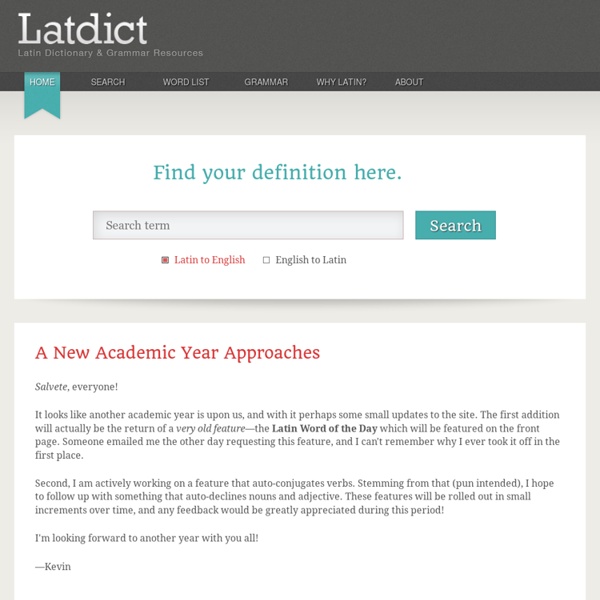



Latin Dictionary Online Translation LEXILOGOS dies Veneris VIII Aprilis Latin dictionary Latin Latina •Latin > English & English > Latin dictionary (Notre Dame) • Latin-English dictionary (LatDict) • Latin-English Dictionary • Latin-German dictionary • Latin-German dictionary (Auxilium) • Latin-German dictionary (Navigium) • Latin-Dutch Dictionary • Latin-Italian Dictionary • Latin-Spanish Dictionary • Latin-Estonian Dictionary • Latin-Hungarian dictionary • Latin dictionary founded on Andrews' edition of Freund's Latin dictionary, by Charlton Lewis & Charles Short (1879) (Perseus) • Copious and critical Latin-English lexicon, founded on the Latin-German Lexicon of William Freund, by Ethan Allen Andrews (1851) • Latin dictionary for schools by Charlton Lewis (1916) • Latin-English dictionary for the use of junior students, by John White (1904) • Copious and critical English-Latin lexicon, founded on the Latin-German Lexicon of Charles Ernest Georges, by Joseph Riddle, Thomas Arnold & Charles Anthon (1864) • English-Latin lexicon • Deutsch-Latein
Perseus Digital Library Буквица Введение В этой статье мы будем изучать древнерусский язык и, в сравнении с ним, древлесловенский. Основной упор будет сделан на привитие начатков образного мышления, а не на фонетику и морфологию, как в академических учебниках по старославянскому языку. Читая фонетически, мы, как бы, скользим по поверхности информационного массива, не умея уйти на глубину. Чтобы понимать что-то глубинно, нужно освоить не сочетание букв, не буквонаписание, а соединение образов, соединение по сути : почему это говорится так, а это иначе и какой смысл в это глаголение вложен. Это и будет самое правильное: нужно познать основу, чтобы понять всё остальное. Русский язык был и до сих пор пока ещё остается языком образов глубинного смысла, в отличие от европейских, дающих поверхностное (в ширь) понимание передаваемой информации. В самой структуре простых слов русского языка заложены фундаментальные знания обо всем. Наш язык сохранил базовые механизмы исконной речи (образность) примерно на 30-40%.
Ammian (Ammianus Marcellinus) The Text on LacusCurtius The English translation is by J. C. Rolfe, printed in the Loeb Classical Library edition, 1939‑1950: I followed my usual method and retyped it rather than scanning it; not only to minimize errors prior to proofreading, but as an opportunity for me to become intimately familiar with the work, an exercise which I heartily recommend. Except for that one passage, however, as of writing (early February 2008), the Latin text is still that of the unspecified edition on Forum Romanum, only a few errors being corrected, although I've already added most of the local links for chapters and sections — and all the snippets of Greek, uniformly garbled in the Forum Romanum transcription, have been restored. Further details on the technical aspects of the site layout follow the Table of Contents. The Author and the Text: Background Assessments of Rolfe's Translation Ask someone who had nothing to do with the book, however, and you can get some pretty stiff answers. J.
Beginners' Latin This tutorial is a beginners' guide to the Latin used in documents between 1086 and 1733. It is the first online tutorial to help you learn the Latin from this period. Try our new Advanced Latin The tutorial covers Latin as used in England between 1086 and 1733, when it was the official language used in documents. Latin. No previous knowledge of Latin is required. Be a beginner Want to refresh your skills Have studied classical Latin and want to find out about Latin from a different period All of the grammar is fully explained. You can practise by translating sentences taken from real documents held at The National Archives. , written in 1086. Where to start Tips on learning Latin Tutorial Twelve lessons Reference Word list, common problems, dating Latin documents and much more Activities More documents to practise on. Further practice
Китайско-русский, русско-китайский онлайн словарь Cidian A Gateway to Ancient Rome William Smith's Dictionary of Greek and Roman Antiquities, an encyclopedic work containing a lot of good basic information (and references to primary sources), was published in 1875: it is thus an educational resource in the public domain. I've been putting a large selection of articles from it online, often as background material for other webpages. It is illustrated with its own woodcuts and some additional photographs of my own. Chariots and carriages, the theatre, circus and amphitheatre, roads, bridges, aqueducts, obelisks, timepieces, organs, hair curlers; marriage & children, slaves, dance, salt mines, and an awful lot more; among which special sections on law, religion, warfare, daily life, and clothing.
Lewis and Short Latin-English Lexicon Lewis & Short A Latin Dictionary (1879) Logeion For most purposes, this separate database for a single dictionary should now be obsolete. You can consult all these resources together in Logeion, which contains copies of the dictionaries that are more frequently updated, and more besides: the DGE and DuCange accompany LSJ and Lewis & Short, and you will also find frequency data, collocations, and examples from the corpus. Click the link here for an example. Tips for using this form Click SEARCH (or hit Enter at anytime) to execute your Search; click CLEAR to clear the entire form and start over. Source
Latin Phrases